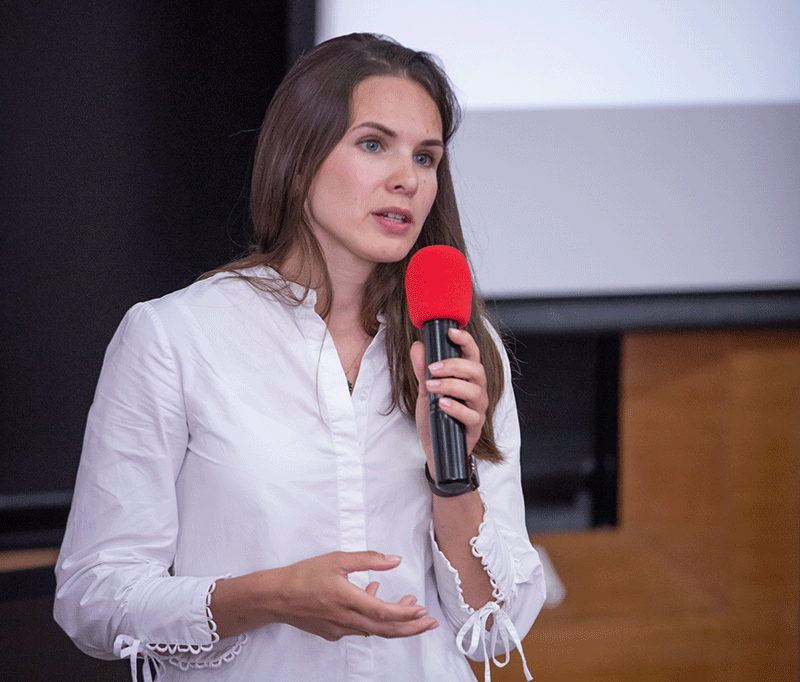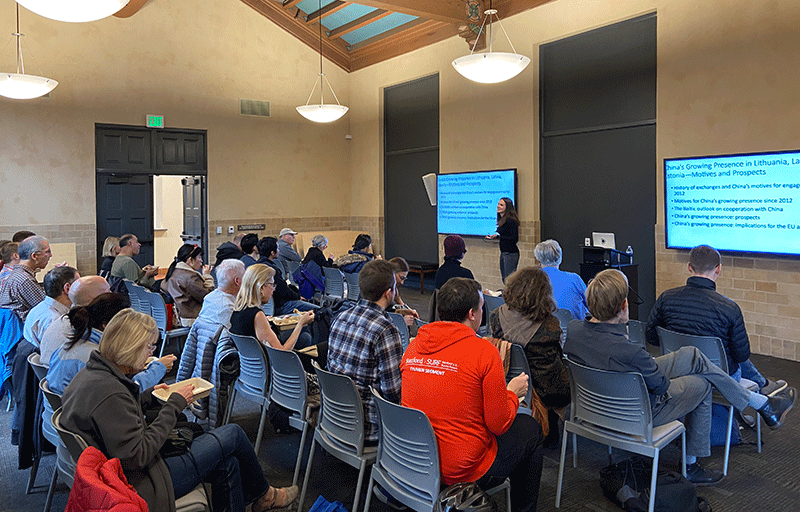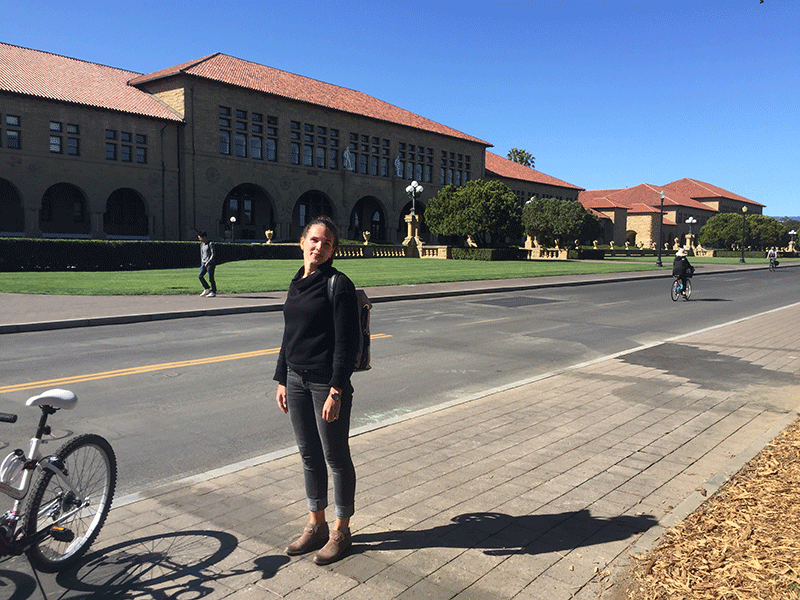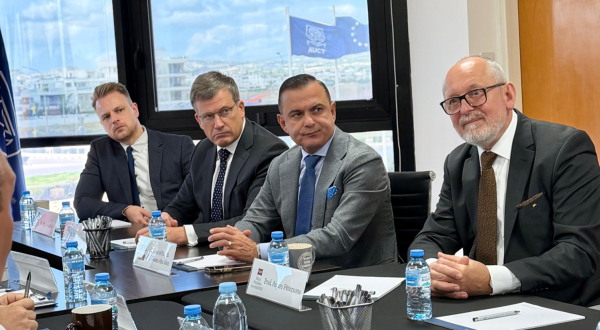RSU Researcher and Political Analyst Una Bērziņa-Čerenkova: Between Latvia, China and the US
In 2019, Una Bērziņa-Čerenkova, researcher, lecturer, political analyst and the Director of the Rīga Stradiņš University (RSU) China Studies Centre, was among the recipients of the coveted Fulbright Scholarship handed out by the US Embassy in Latvia. She has been studying the relationship between China and the Baltic States and China’s trans-regionalism policy, more commonly known as the Belt and Road Initiative, at the Stanford University Centre for East Asian Studies for five months.
‘It is very likely that the coronavirus, which has had a significant effect on the national economy, will cause China to reduce its emphasis on the Belt and Road Initiative. This initiative was announced by the President of China in 2013 to create roads across Eurasia to facilitate the flow of goods between China and Europe. Unfortunately given the current situation, China is unable to cover all the expected costs and will prioritise domestic expenses,’ Bērziņa-Čerenkova predicts.
Una Aleksandra Bērziņa-Čerenkova. Photo: Wuer Photography Studio
What have you accomplished in your five months in the US?
I ended up doing more research and activities in the US than I had planned: I managed to finish my research article, familiarise myself with the scientific resources at Stanford and discussed matters that I’m interested with the university’s academic staff.
‘My US colleagues invited me to conduct a lecture in the Stanford University library on the history of relations between the Baltic countries and China. The lecture was widely attended, and I am very pleased about it,’ says RSU researcher Una Bērziņa-Čerenkova. Photo from a personal archive.
I advised master’s students who were interested in analysing Chinese political discourse. There were several students from Singapore, who were fluent in Chinese, who were researching current political events in China using discourse analysis theories, which are the topic of several of my publications.
Because I teach the Foreign Policy Vectors of the People's Republic of China course for students in the International Relations and Diplomacy master’s study programme at RSU, I used the opportunity that Stanford University offered and attended several similar courses.
I had the opportunity to consult and cooperate with such outstanding researchers as Alice Miller who had worked as a Chinese history analyst at the Central Intelligence Agency (CIA) for 30 years and later became an academician, and Thomas Fingar, who is among the most renowned researcher of US – China relations. These researchers not only analyse relations between both countries, but also build them.
I also worked as a member of the Russian analysis group at the Freeman Spogli Institute for International Studies. My American colleagues entrusted me to develop a presentation on the relationship between Russia and China from the Chinese perspective. I used resources in both Russian and Chinese.
Una Bērziņa-Čerenkova in Stanford in October 2019. Photo from personal archive.
You mentioned that you have established a wide network of contacts at Stanford University. Can we expect any guest lecturers to come to RSU in the future?
Yes, definitely. Currently, four professors from Stanford University are willing to visit RSU to deliver lectures and seminars. Unfortunately, due to the coronavirus outbreak, this will not happen during the spring semester.
The aforementioned professors are researching very diverse fields. Their lectures and seminars would most likely will cover US - China relations and the Chinese influence over the Pacific region.
How will what you saw and experienced at Stanford University influence your work at the RSU Faculty of European Studies?
The most important lesson I learned is that it is not a sin to make students read a lot. Of course, many of our master’s students are working and very busy, but I must give them the opportunity to read scientific literature. They must learn to read literature like this in order to learn how to formulate their own thoughts using scientific language.
Another lesson I learned is that lecturers should listen to all questions from students equally without sorting them into right, or wrong questions. I must answer all questions with respect towards the student and without expressing my judgement of either the question or the questioner.
Since the most up-to-date literature was available to me in the US, my students will have also the opportunity to read it.
What can RSU learn from Stanford University?
A lot, but the level of studies at RSU and our knowledge is very high. My US colleagues listened to and used my experience and knowledge as much as I did theirs.
My US colleagues appreciated the module system at RSU and the way this gives students the chance to gain knowledge in a concentrated way, thinking about and discussing only one study course per month. They considered this an excellent solution.
The main challenge at Stanford University is that students come to lectures without remembering anything from the previous one, because they attend many study courses at the same time.
The advantage of the RSU Faculty of European Studies is the small number of students in each group. The lecturer can therefore be available to and work with each student individually, consult students and maintain an emotional bond with them, which is important.
We do not have to conduct lectures for 200-300 people. This would provide little added value, because by only listening students can gain the same knowledge as they could at home sitting on their couch.
This year is the 70th anniversary of RSU. What would you wish for your university?
I wish for it to become more recognisable in both Europe and the world, because we have a lot to give and to tell. I also wish for RSU to get a louder voice and independence, and the rest will follow.
Facts about Una Aleksandra Bērziņa-Čerenkova
- Dr. sc. pol.
- Graduated from the RSU Political Science doctoral study programme in 2014
- Graduated from the RSU Political Science master’s study programme in 2008
- Associate Researcher at the Latvian Institute of International Affairs since 2016
- Head of RSU China Studies Centre since 2015
- Speaks six languages: Latvian, Russian, English, Chinese, French and Lithuanian







